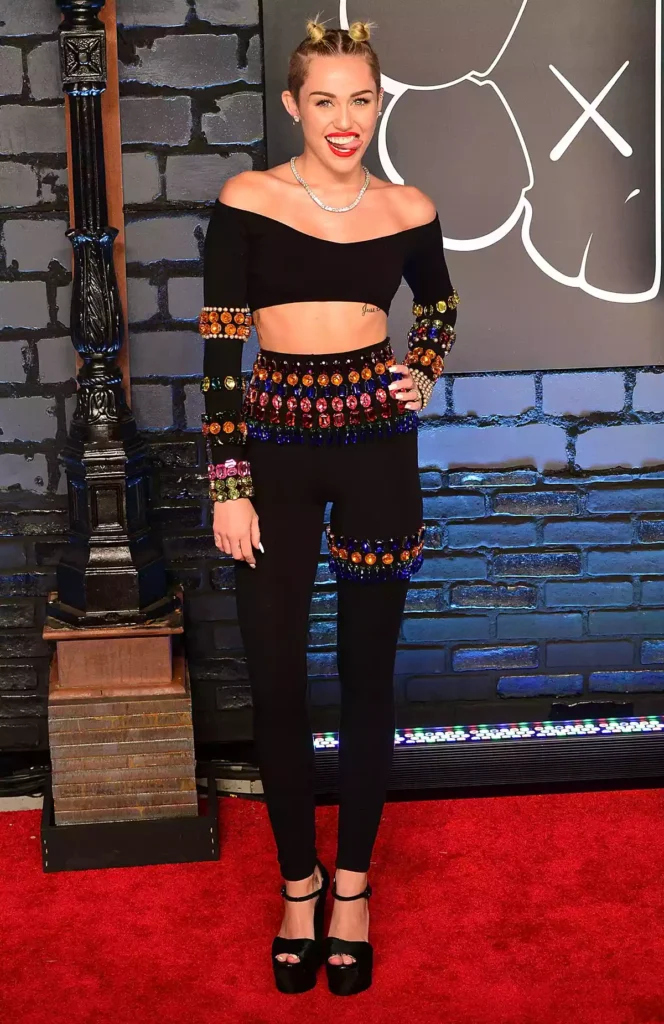On Monica Lewinsky’s Podcast, the Pop Icon Reflects on Her Struggles with Body Image, the Fallout from the 2013 VMAs, and the Cost of Owning Her Sexuality
In a rare and vulnerable conversation, global pop sensation Miley Cyrus opened up about her deepest insecurities and the lasting scars left by public scrutiny. Appearing on the June 9 episode of Reclaiming with Monica Lewinsky, the 32-year-old artist discussed how years of body shaming and harsh criticism have shaped how she sees herself—even today.
Cyrus, whose bold performance at the 2013 MTV Video Music Awards alongside Robin Thicke drew both massive attention and backlash, recalled the lasting emotional toll of that period. “People were putting my head on different, very unattractive things,” she said. “I still see that when I put on a bathing suit to this day.”

That moment of cultural infamy, once intended as a declaration of artistic freedom, became a turning point in her life—one that she admits continues to haunt her self-image. While on a recent girls’ trip, Cyrus confessed she felt out of place wearing modest swimwear. “Everyone else had on a string bikini,” she shared. “I was wearing like a tank top. I don’t even know if people wear tankinis anymore.”
Podcast host Monica Lewinsky reassured her, joking, “You’re bringing them back.” But for Cyrus, the comment from her sister hit harder: “She said, ‘You’re you, so this is cool. I guess this is in now. You’re making this cool. But, like, you know this is what a grandma wears to the beach.’” The observation drove home how deeply the past still affects her. “It just hit me, like oh, I’m still so insecure about those memes about my body,” she admitted.
Beyond personal insecurities, Cyrus also explored the broader impact of her 2013 performance. “That was the time where I just got hit so hard and I was so embarrassed,” she told Lewinsky. “There was even a time where my brother and sister didn’t want to go to school because of how humiliated they were to be related to me.”
The Flowers singer, one of six siblings, reflected on how fame strained her family dynamics. “My brother said, ‘I don’t judge you, but you could understand how hard it is for me to go to school, and you be my sister.’ I was a hard sibling to have as a little girl,” she shared. “So I was like, ‘All right we’re even.’”
Yet the fallout from that chapter of her life didn’t end with family. It deeply affected her relationships and self-worth. “I lost everything during that time in my personal life because of the choices I was making professionally,” Cyrus said. “No one wanted to date me because they didn’t want to be with a woman [whose] sexual expression part was not for them. It was like shared with the world.”

That emotional cost was amplified by societal expectations that women’s sexuality should be kept private—owned, even. “Guys, when I would try to date, or who I was engaged to at the time, that didn’t work out,” she explained. “Because I was sharing a part of myself that men wanted to be saved for them only.”
In a culture that often demands women perform and then punishes them for it, Miley Cyrus’s story is a poignant reminder of the human being behind the headlines. Her honesty shines a light on the pressures women in the spotlight endure and the long road to healing that follows.
Through conversations like this, she’s reclaiming not just her narrative—but also giving others permission to be vulnerable, too.








